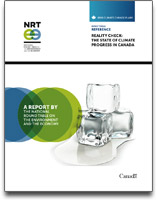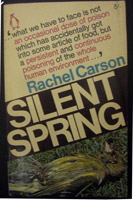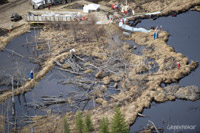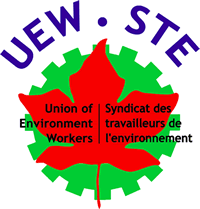
News |
- Manitoba Scores Low Marks on Green Report Card
- UN Sounds Alarm with Environment Outlook
- NRTEE Reality Check on Canada's Climate Progress
- Carson's Silent Spring Fifty Years Old
- Groundwater Bill Comments Shared, Committee Reports Monday
- 3 More Oil Spills Raise Safety Concerns
- Blackout Speakout A Canadian Campaign Success
- Germany Solar Covers Almost 50% of Country
- Conservatives Speaking Out Against Omnibus Budget
- Air Pollution Monitoring Team Now Monitor Job Listings
- Loss of Community Pastures Threatens Native Grasslands
- Canadian Boreal Forest Agreement Questioned
| Manitoba Scores Low Marks on Green Report Card | 15 June 12 |
 Ontario has been named Canada's greenest province in the latest Green Provincial Report Card from the Corporate Knights, a Canadian company focused on green capitalism. British Columbia followed with a close second, with both top provinces being awarded an A-.
Ontario has been named Canada's greenest province in the latest Green Provincial Report Card from the Corporate Knights, a Canadian company focused on green capitalism. British Columbia followed with a close second, with both top provinces being awarded an A-."Despite Ontario and British Columbia receiving high grades, there's room for vast improvement," said lead researcher Erin Marchington, adding that if all provinces and territories achieved best practices provinces would score top marks nationwide. Manitoba scored a C+, and ranked 11th among the provinces and territories placing ahead of only Saskatchewan and Alberta. According to the report, although Manitoba performs well in water and energy efficiency the economy is wasteful. Manitoba has the lowest waste diversion per capita in Canada; the second-highest kilometres travelled per capita, the lowest fuel efficiency in the country, and Manitoba's parks score lowest on ecological integrity. The research team used a series of 35 indicators grouped into seven categories: air and climate, water, nature, transportation, waste, energy and buildings, and innovation. The methodology was developed with assistance of the Green Provinces Advisory Committee: Faisal Moola, David Suzuki Foundation program director of terrestrial conservation and science; Sachi Gibson, Pembina Institute technical and policy analyst; and Jose Etcheverry, assistant professor of environmental studies at York University. View June 8, 2012 Corporate Knights Green Provincial Report CardView June 8, 2012 Corporate Knight press release View June 8, 2012 Brandon Sun coverage View June 8, 2012 CBC coverage Sources:
Corporate Knights
|
|
 Print version Print version |
Top |
| UN Sounds Alarm with Environment Outlook | 15 June 12 |
 The United Nations Environment Programme's (UNEP) sounded the alarm in its fifth Global Environment Outlook (GEO-5) report, published two weeks before the Rio+20 summit in Brazil June 20-22.
The United Nations Environment Programme's (UNEP) sounded the alarm in its fifth Global Environment Outlook (GEO-5) report, published two weeks before the Rio+20 summit in Brazil June 20-22.The GEO-5 report, three years in the making and the United Nations' main health-check of the planet, urges governments to create more ambitious targets or toughen existing ones. "If current trends continue, if current patterns of production and consumption of natural resources prevail and cannot be reversed and 'decoupled', then governments will preside over unprecedented levels of damage and degradation," said United Nations (UN) Under-Secretary General and UNEP Executive Director Achim Steiner. GEO-5 assessed progress and gaps in meeting 90 internationally agreed goals from UN conventions. Significant progress was found for just 4 goals, with some progress made for 40 goals, and 32 goals with very little or no progress. UNEP called on governments to focus their policies on the key drivers behind climate change, notably: population growth, urbanisation, fossil fuel-based energy consumption, and globalisation. View June 6, 2012 United Nations Environment Programme's (UNEP) report (PDF)View June 6, 2012 Huffington Post coverage View June 6, 2012 CBC News coverage View United Nations Conference on Sustainable Development Rio+20 page View more on Manitoba Wildlands Rio+20 page Sources:
United Nations, Huffington Post, CBC
|
|
 Print version Print version |
Top |
| NRTEE Reality Check on Canada's Climate Progress | 15 June 12 |
 "Canada will not achieve its 2020 GHG emission reductions target unless significant new, additional measures are taken. More will have to be done. No other conclusion is possible," states a recent report by the National Round Table on the Environment and the Economy (NRTEE).
"Canada will not achieve its 2020 GHG emission reductions target unless significant new, additional measures are taken. More will have to be done. No other conclusion is possible," states a recent report by the National Round Table on the Environment and the Economy (NRTEE).The report, Reality Check: The State of Climate Progress in Canada, was requested by Environment Minister Peter Kent in 2011. At the time Minister Kent stated NTREE was "uniquely positioned" to assess federal, provincial and territorial governments' efforts to reduce GHGs. Ottawa's overall goal is to reduce emissions by 17 per cent from 2005 levels. The report's findings have reinforced some key truths about current climate change policy in Canada:
This will be the second last report from the NTREE, which for the past 25 years has provided original research and advice on everything from the effect of climate change on the economy to boreal forest ecological services, but whose funding was cut in the 2012 Canada Budget. Former Conservative MP and member of NTREE Bob Mills described the decision to cut NTREE funding as "dumb." "If you're smart you surround yourself with really smart people. And if you're dumb, you surround yourself with a bunch of cheerleaders. We don't need cheerleaders. What we need are smart people," Mills said. View National Round Table on Environment and Economy (NRTEE) reportView June 13, 2012 CBC News coverage View June 13, 2012 Zizzo Allan Climae Law LLP coverage View June 13, 2012 iPolitics coverage View June 7, 2012 CBC News coverage View Manitoba Wildlands Canada Climate Change Initiatives page Sources:
NRTEE, CBC
|
|
 Print version Print version |
Top |
| Carson's Silent Spring Fifty Years Old | 15 June 12 |
 June 2012 marks 50 years since publication of Rachel Carson's Silent Spring, the book that helped launch the environmental movement. An ecologist and writer, Carson was the first to publicly expose the detrimental effects of pesticides on the environment, particularly on birds, as well as the hazards they pose to human health.
June 2012 marks 50 years since publication of Rachel Carson's Silent Spring, the book that helped launch the environmental movement. An ecologist and writer, Carson was the first to publicly expose the detrimental effects of pesticides on the environment, particularly on birds, as well as the hazards they pose to human health. Her book, "The Sea Around Us," was published to wide acclaim, and gave her a name as a conservationist. The title of Silent Spring is from the Keats poem, "La Belle Dame sans Merci," which contains the line "and no birds sing." The title is also Carson's core message about the devastation caused by pesticides. Silent Spring warned that extensive spraying with certain pesticides was damaging the food chain, and the entire ecosystem. Carson stressed human beings exposed to these pesticides were at risk of cancer and other diseases. The book helped establish the widely understood ecological principle that every ecosystem is interrelated and that damage to any one component causes damage to all other elements. A new edition of Silent Spring has been published for the Rio + 20 summit in Rio de Janeiro this month. View Michigan State University Museum articleView May 31, 2012 Haaretz article View Environment & Society Portal popular culture study View Silent Spring Wikipedia entry Sources:
|
|
 Print version Print version |
Top |
| Groundwater Bill Comments Shared, Committee Reports Monday | 8 June 12 |
 Manitoba Conservation & Water Stewardship has now shared the comments received in response to a discussion paper on the proposed Bill 25: The Groundwater and Water Well And Related Amendments Act. Manitoba Wildlands had previously been refused access to these documents, but MCWS indicated that this was in error.
Manitoba Conservation & Water Stewardship has now shared the comments received in response to a discussion paper on the proposed Bill 25: The Groundwater and Water Well And Related Amendments Act. Manitoba Wildlands had previously been refused access to these documents, but MCWS indicated that this was in error."We commend the Government on sharing this information, and we hope that this may be a sign of good things to come from our new Conservation Minister," said Manitoba Wildlands Director Gaile Whelan Enns. The new groundwater legislation received second reading in June 5, 2012. The Legislative Committee will report Monday, June 11, 2012. Any member of the public can register to speak to this, or any other piece of legislation, at Committee. If you are interested in presenting please call the Manitoba Legislative Clerk at (204) 945-3636. Or alternatively, register in person at 6:00 pm in Room 255 of the Manitoba Legislature. Manitoba Wildlands is posting the comments received in response to a discussion paper on the new groundwater legislation on our Water Initiatives page. View Bill 25: The Groundwater and Water Well And Related Amendments ActView June 7, 2012 Legislative Assembly of Manitoba report (PDF) View May 18, 2012 Manitoba Wildlands news item View May 18, 2012 Manitoba Wildlands Reality Check #35: Do Manitoba and Canada Have Public Consultation Standards? View Legislative Assembly of Manitoba A Guide For The Public Presentations Before A Standing Committee Of The Legislative Assembly Of Manitoba View Manitoba Wildlands Manitoba Water Initiatives page Sources:
Manitoba Conservation & Water Stewardship, Manitoba Wildlands
|
|
 Print version Print version |
Top |
| 3 More Oil Spills Raise Safety Concerns | 8 June 12 |
 Three Alberta pipeline spills in less than a month are raising safety concerns about pipelines.
Three Alberta pipeline spills in less than a month are raising safety concerns about pipelines.June 7, 2012 Sundre Petroleum Operators Group, a not-for-profit society, notified Plains Midstream Canada of a major leak on the Rainbow Pipeline near Sundre, Alberta. The spill has resulted in up to 475,000 litres of light sour crude oil flowing into Jackson Creek, a tributary of the Red Deer River. "I would expect that the vast majority of it will end up in the Red Deer River," said Bruce Beattie, Reeve of Mountain View County. "It's a major concern." The area around Sundre is common getaway area for people in Calgary and popular with anglers and hunters because of the pristine wilderness. The Rainbow Pipeline also saw one of the largest pipeline spills in the Alberta history - a 4.5 million-litres of oil spill northeast of Peace River, Alberta April 29, 2011. Clean up the April 29, 2011 pipeline spill continues. May 19, 2012 an estimated 800,000 litres of spilled oil was discovered southeast of Rainbow Lake, 165 km south of the Northwest Territories border. As with many recent pipeline accidents, Calgary-based Pace did not detect a problem, but was informed by another company after the spill was spotted from an aircraft. The spill, which came from above ground piping connecting an underground pipeline now covers 4.3 hectares. "First Nations need to be informed immediately when such incidents occur and certainly not by media ten days after the fact. Large and uncontrolled oil spills are not rare; this is the second in two years in this region. Muskeg is critical habitat for a range of culturally important species," said National Assembly of First Nations Chief Shawn Atleo. May 9. 2012 AltaGas Ltd. confirmed a pipeline rupture resulting in natural gas and light oil leak of approximately 1,600 litres near the Hobbema Alberta, town site of Samson Cree First Nation. The farmer on whose land the leak occurred heard a boom on April 30, 2012. Then on May 8, 2012 his children found the spill coming to the surface. "If this rupture did occur 10 days ago, why has it taken the company so long to respond?" questioned Greenpeace Canada Climate and Energy Campaigner Mike Hudema. Alberta is criss-crossed with pipelines, which consolidate oil and gas and bring them to plants that strip away impurities like water. With numerous planned pipeline extensions, including the Enbridge Northern Gateway pipeline, pipeline failures are likely to increase. View June 8, 2012 CBC News coverageView June 8, 2012 Globe and Mail coverage View June 8, 2012 Sean Kheraj article View June 8, 2012 CTV News coverage View June 8, 2012 Financial Post coverage View June 8, 2012 Calgary Herald coverage View June 5, 2012 Assembly of First Nations press release View May 30, 2012 Globe and Mail Coverage View May 9, 2012 Vancouver Observer article View May 9, 2012 Edmonton Journal article View May 9, 2012 Globe and Mail coverage Sources:
Globe and Mail, Vancouver Observer, Assembly of First Nations
|
|
 Print version Print version |
Top |
| Blackout Speakout A Canadian Campaign Success | 8 June 12 |
 On Monday, June 4th, more than 500 web sites went black to protest of the 2012 Candian Budget Bill ( Bill C-38). The campaign started on May 7th with full page ads in major Canadian newspapers and is a collaborative effort of CAPE, CPAWS, David Suzuki Foundation, Ecojustice, Equiterre, Environmental Defence, Greenpeace, Nature Canada, Pembina Institute, Sierra Club Canada, West Coast Environmental Law, and WWF Canada.
On Monday, June 4th, more than 500 web sites went black to protest of the 2012 Candian Budget Bill ( Bill C-38). The campaign started on May 7th with full page ads in major Canadian newspapers and is a collaborative effort of CAPE, CPAWS, David Suzuki Foundation, Ecojustice, Equiterre, Environmental Defence, Greenpeace, Nature Canada, Pembina Institute, Sierra Club Canada, West Coast Environmental Law, and WWF Canada.The Blackout Speakout protest defends two core Canadian values; nature and democracy. Since gaining a majority in the House of Commons, current government actions have been direct in attacking charities that support environmental action and democratic discussion. The current Budget Omnibus Bill includes extreme cuts to science and changes 70 laws, including environmental protection. Success of the Blackout Speakout campaign can be measured by how quickly the federal cabinet rolled out ten ministers at public relations events to 'tell their side of the story'. View Blackout Speakout web siteView June 4, 2012 The Globe and Mail article View June 4, 2012 The Province article View June 4, 2012 CTV News article View June 4, 2012 Yahoo! Canada News article View June 6, 2012 Huffington Post article View June 5, 2012 We Move to Canada blog post View June 4, 2012 Toronto Star article |
|
 Print version Print version |
Top |
| Germany Solar Covers Almost 50% of Country | 1 June 12 |
 On Saturday May 26, 2012, Germany used its solar power sources to produce 22 gigawatts of electricity, setting a new world record. It would take 20 nuclear power plants running at full power to produce as much electricity. This was equal to nearly fifty percent of the country's power use during peak hours Friday and through Saturday.
On Saturday May 26, 2012, Germany used its solar power sources to produce 22 gigawatts of electricity, setting a new world record. It would take 20 nuclear power plants running at full power to produce as much electricity. This was equal to nearly fifty percent of the country's power use during peak hours Friday and through Saturday.Since the Fukushima nuclear plant disaster in Japan, Germany has closed eight nuclear power plants and announced it would be shutting its remaining nine nuclear power plants down by 2022. Germany has long been a leader in the solar power for energy production but really stepped up its efforts to transition to renewables after the Fukushima disaster. "This shows Germany is capable of meeting a large share of its electricity needs with solar power," said Norbert Allnoch, director of the Institute of the Renewable Energy Industry (IWR) in Muenster. "It also shows Germany can do with fewer coal-burning power plants, gas-burning plants and nuclear plants." View May 28, 2012 The Globe and Mail articleView May 28, 2012 The Guardian article View May 31, 2012 Inhabitat article View June 1, 2012 The Huffington Post article View June 7, 2012 The Mark News article |
|
 Print version Print version |
Top |
| Conservatives Speaking Out Against Omnibus Budget | 1 June 12 |
 Opposition to the Canadian Omnibus Budget Bill (Bill C-38) continues to grow. The 425 page Bill C-38 amends, repeals, or in some cases completely replaces nearly 70 Canadian laws.
Opposition to the Canadian Omnibus Budget Bill (Bill C-38) continues to grow. The 425 page Bill C-38 amends, repeals, or in some cases completely replaces nearly 70 Canadian laws.Four former federal fisheries ministers, two former Conservative fisheries ministers and two former Liberal fisheries Minister, have spoken against the changes Bill C-38 will make to the Canada Fisheries Act. "They are totally watering down and emasculating the Fisheries Act," said Tom Siddon, who was fisheries minister for former Conservative prime minister Brian Mulroney from 1985 to 1990. "They are really taking the guts out of the Fisheries Act in devious little ways... they are making Swiss cheese out of it." "How many people in the Finance Committee know anything about steelhead salmon on the West Coast of British Columbia? Where is Canadian industry being ground to a halt today if we take a few weeks to properly look at these amendments?" questioned former Conservative Fisheries Minister John Fraser, who represented Vancouver South, B.C. as Member of Parliament (MP) from 1972 until 1993. "I'm not some left-wing loony. I'm a Conservative. I'm a real Conservative and nobody can pretend to be a Conservative if they are not a conservationist," said Fraser, adding that there will be a "political price" to pay if the government does not listen to Canadians. Green Party leader Elizabeth May and the federal Liberals have jointly concocted a plan to delay the passage of Bill C-38 if the government does not agree to make substantial changes. The Greens do not have official party status in the House of Commons, so Ms. May is not on parliamentary committees. As a tradeoff, she is permitted to propose an unlimited number of amendments to bills that have come back to the House from committees. "The aim is to create such a substantial logjam that the government will have to negotiate removing the environmental and other non-budgetary matters from Bill C-38." said May. View Bill C-38 An Act to implement certain provisions of the budget tabled in Parliament on March 29, 2012 and other measuresView May 31, 2012 Sierra Club of Canada, Submission to the Senate Committee on Energy (Re: C-38) View May 29, 2012 CBC News coverage View May 28, 2012 Globe and Mail coverage View May 28, 2012 RT coverage View Black Out, Speak Out website Sources:
Hill Times, Globe and Mail
|
|
 Print version Print version |
Top |
| Air Pollution Monitoring Team Now Monitor Job Listings | 1 June 12 |
 Canada plans to break up a team of seven Environment Canada smokestack specialists who travel around Canada, measuring emissions and analyzing data.
Canada plans to break up a team of seven Environment Canada smokestack specialists who travel around Canada, measuring emissions and analyzing data.The team's research has been used in development of pollution standards, assessment of pollution sources and measurement of pollution-reduction technologies. The team monitors pollution sources, including cancer-causing emissions from installations such as hospital incinerators, crematoriums, boilers, smelting furnaces, landfills and coal-fired power-generating stations. They recently conducted research supporting federal efforts to produce a credible monitoring plan Alberta's oilsands sector pollution. Thomas Duck, an atmospheric scientist from Dalhousie University in Halifax, suggested the cuts would jeopardize the government's plans to create a credible monitoring plan for the oilsands. "Why announce a (oilsands-monitoring) plan and then undermine your own ability to implement it. It's vandalism of our scientific capacity," said Duck. The Canadian union representing about 6,000 environment workers has asked the Canadian government to reverse its decision, warning there are serious public health risks across the country emerging from the government's decision. "If they're not monitoring any more, we don't know what level of carcinogens are being put in the air which (has) a huge link towards many different types of cancer," said Todd Panas, president of the Union of Environment Workers. "It just shows the government doesn't seem to be concerned with the health of Canadians." View May 28, 2012 Montreal Gazette editorialView May 26, 2012 Albatross coverage View May 25, 2012 Post Media coverage Sources:
Post Media, Montreal Gazette
|
|
 Print version Print version |
Top |
| Loss of Community Pastures Threatens Native Grasslands | 25 May 12 |
 The Government of Canada announced in the 2012 Budget that it would shift responsibility for 900,000 hectares of community pasture to the prairie provinces over six years, starting in 2013.
The Government of Canada announced in the 2012 Budget that it would shift responsibility for 900,000 hectares of community pasture to the prairie provinces over six years, starting in 2013.There are 24 community pastures in Manitoba, 61 in Saskatchewan and 2 in Alberta. These grass and rangelands were transferred to federal government management in the 1930s as part of a soil conservation program. Consultants hired to measure the costs and benefits of the community pastures determined in 2006 the program generated private and public benefits amounting to $58.3 million annually. Producers pay almost all of the program costs through fees paid to graze about 220,000 cattle on the pastures. The Canadian Cattlemen's Association (CCA) is calling on Ottawa to delay its plan to transfer management of 900,000 hectares of community pasture to the prairie provinces. "The environmental benefits that we get off of the community pastures is very beneficial not just for agriculture but for all of society. It has been positive for our industry and we would hate to see it disappear," says CCA President Martin Unrau. Manitoba community pastures are on provincial public lands. The pastures are often home to listed species or provide important habitat for a range of flora and fauna. View May 24, 2012 Huffington Post coverageView May 17, 2012 Saskatoon Star Phoenix coverage View May 9, 2012 CBC News coverage View May 5, 2012 Winnipeg Free Press coverage View May 7, 2011 Manitoba Wildlands Reality Check: Community Pastures - Can We Protect These Lands? Sources:
Huffington Post, Winnipeg Free Press
|
|
 Print version Print version |
Top |
| Canadian Boreal Forest Agreement Questioned | 25 May 12 |
 Signed two years ago, with commitments to defer logging starting three years ago, the Canadian Boreal Forest Agreement (CBFA) was hailed as a historic collaborative effort between environmental groups, industry and government to protect large tracts of boreal forest across Canada. Three of nine environmental groups that signed the agreement; Canopy, Greenpeace and ForestEthics are publicly making it known how little progress they feel has been made.
Signed two years ago, with commitments to defer logging starting three years ago, the Canadian Boreal Forest Agreement (CBFA) was hailed as a historic collaborative effort between environmental groups, industry and government to protect large tracts of boreal forest across Canada. Three of nine environmental groups that signed the agreement; Canopy, Greenpeace and ForestEthics are publicly making it known how little progress they feel has been made."The results are sobering and disappointing," said Nicole Rycroft, executive director of Canopy, a non-profit environmental group that works with large forest products customers,.. "We can't afford to continue working at this pace." As well, First Nation leaders question the CBFA citing a lack of public consultation and inclusion in planning the CBFA. "The invitation to participate is always after the fact," said Norman Young, Grand Chief of the Algonquin Nation Secretariat, which represents two first nations in Quebec and Ontario. "They draw up the documents and then say, 'The door's open, come on in.' That is not consulting." "We have never understood how anyone would believe a map showing millions of hectares in Tolko's Manitoba licence area as 'suspended harvest in boreal caribou range'. Logging continues, and woodland caribou are particularly at risk there due to road building, logging, and intended new transmission corridors," commented Gaile Whelan Enns. View May 16, 2012 The Globe and Mail articleView May 16, 2012 ForestTalk.com article View March 16, 2011 The Globe and Mail article View May 26, 2010 The Dominion article View May 2012 Canopy Planet Boreal Forest Status Report (PDF) View Canadian Boreal Initiative Canadian Boreal Forest Agreement page Sources:
Globe and Mail, Canadian Boreal Initiative
|
|
 Print version Print version |
Top |


 RSS Feeds:
RSS Feeds: